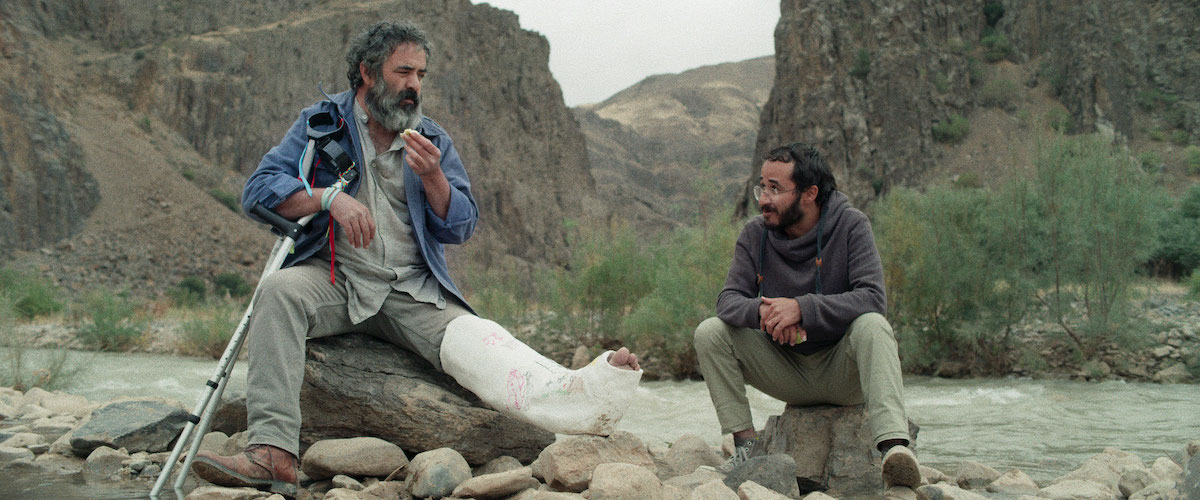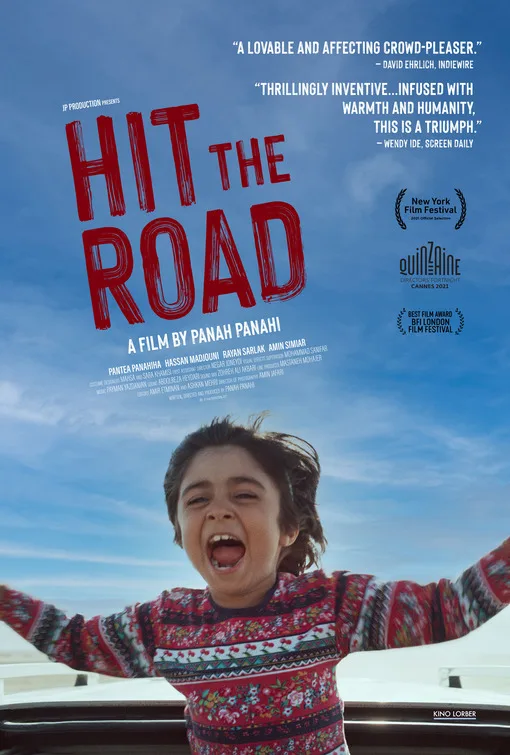“Where are we?”
The masterful “Hit the Road,” writer/director Panah Panahi’s elegiac feature debut that traces a family on a mysterious road trip somewhere rural outside of Tehran, starts with this question. It’s asked by the story’s unnamed Mom, played introspectively by the great Pantea Panahiha. “We’re dead,” cheerily responds her younger son (Rayan Sarlak), the film’s impossibly cute, wide-eyed and long-lashed six-year-old trickster, drawing plenty of awws and belly laughs whenever he opens his know-it-all mouth or pulls a funny schtick, like hiding his dad’s cell phone.
Though when the kid first makes this intense quip, we aren’t quite acquainted with the rascal’s irresistibly witty ways yet, a disposition that often injects the picture with moments of comic relief that runs parallel to the movie’s melancholy. And Panahi is so precise behind the camera that his inspired compositions of the family inside the car—somehow, both spacious and claustrophobic—as well as the languorous rays of sun that shoot their way into the confinement dreamily, don’t necessarily challenge the little one’s otherworldly remark, very much on purpose. That being said, you may be forgiven to think that you’re in the presence of a mystic, spiritual or even supernatural “Little Miss Sunshine” for a second there, one that is set on the road to the Pearly Gates.
But Panahi is also quick to gracefully steer you back into reality. No, no one is dead amongst the family of four—also including Hassan Madjooni’s wisely deadpan Dad with a broken, painfully itchy leg in a cast and the pensive, twentysomething Big Brother, played by Amin Simiar. They are just in somewhat of a disorienting rush—as we find out in doses, the quartet is making a dash for the Turkish border to smuggle the older son out of the country for reasons Panahi smartly leaves mostly unexplained, a perceptive decision that propels the alluring aura of secrecy in “Hit the Road.”
In strictly speculative terms, the filmmaker’s choice to leave things unsaid might have something to do with the Panahi name. Yes, Panah is the son of the legendary Iranian auteur Jafar Panahi, who is still barred from filmmaking and departing Iran due to the regime’s enraging 2010 ruling that found J. Panahi guilty of spreading anti-government propaganda. (Thankfully, that didn’t stop him from making unofficial movies without permits, like masterpieces “This Is Not A Film” and “Taxi.”) In that regard, it might very well be in a subconsciously protective spirit that his son Panah leaves story’s political facets obscure, knowing what buttons he can and cannot push, what he can and cannot spell out. But that doesn’t mean “Hit The Road” is a coy version of something that could have been superior if it were more obvious. Far from it. By concealing some of the nitty-gritty, Panahi makes an even more fiercely political point throughout “Hit The Road.” Here, the details don’t matter as much as their heartbreaking consequences: the irreversibly burdened families unfairly torn away from their loved ones, and a society that carries those scars.
Undoubtedly a disciple of both the Father Panahi and Abbas Kiarostami, the late Iranian master who has been deeply influential in his life (there are noticeable traces of “Taste of Cherry” here), Panahi organically laces “Hit The Road” with interludes of sharp humor and casual contemplation. Furthermore, he intertwines the family’s predicaments (the root of which is hidden from the young son also) with that of the country they dwell in. What’s most astonishing is the sense of freedom Panahi generates by simply capturing the love and commitment among the four. If somehow the sacrifice the parents are making for their offspring and the personal risk they gladly assume isn’t already enough evidence of their mutual unconditional affection, keep a close eye on everyone’s body language. The way the young son curls up on his dad’s torso, the genuine temperament in which the mom sings to her older son to cheer him up, the way they all bond around conversations trivial and weighty. Under Panahi’s baton and through cinematographer Amin Jafari’s naturalistic lens, it all unfolds so effortlessly that you sometimes forget their mission, and think they’re perhaps on vacation.
But despite all the exuberant Iranian ballads we get to hear over the course of “Hit The Road” (apparently, all pre-revolution songs that today’s administration frowns upon, according to Panahi), this isn’t an inherently blissful yarn, as the mournful keys of a Schubert piece remind us throughout. For every laugh the family lets out, for each merry chance encounter they experience—like an oddly hysterical one with a Lance Armstrong-loving cyclist—there are tears shed in secret, cagey deals made in the shadows and the impending separation they inch closer to with every passing moment. Still, Panahi doesn’t abandon his sense of hope or humor in the final stretch. By the border, under twinkly stars that defy the pitch-black skies, he winks at the audience with a magical, low-key Kubrickian cosmic scene that centers the film on the innocence of the young child. It’s an unforgettable parting note by a filmmaker that both honors his father’s ongoing legacy, and inaugurates his unique, very own voice.
Now playing in select theaters.




















